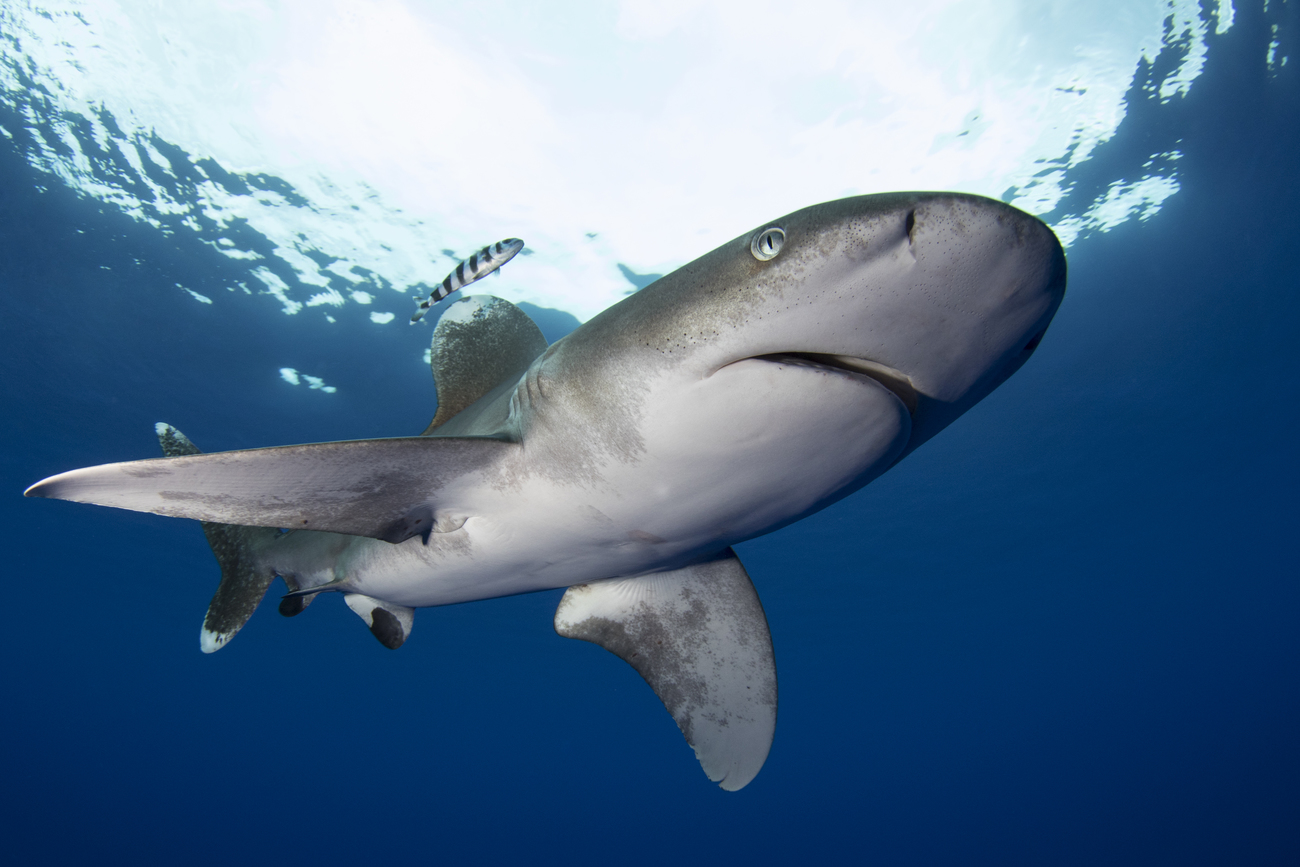Policy Conventions & Agreements - Global
Protection for wildlife & habitats is preserved in global agreementsurgently needed protection granted to shark species on the brink of extinction
urgently needed protection granted to shark species on the brink of extinction

(Gandhinagar, India – 20 February 2020) – There was a vital conservation win for a critically endangered species of shark today at the 13th Conference of the Parties (CoP) of the UN Convention on the Conservation of Migratory Species of Wild Animals (CMS) in Gandhinagar, India, as governments accepted the proposal to list the oceanic whitetip shark for protection.
Once considered one of the most common tropical sharks in the world, the oceanic whitetip is now one of the most endangered.
Attending government representatives from the 130 member parties to CMS accepted by consensus Brazil’s proposal to list the oceanic whitetip shark on Appendix I of CMS – the highest level of protection possible – to prohibit catch of the species throughout its range.
Megan O’Toole, IFAW’s Senior Programme Manager, International Policy, welcomed the decision, saying: “We are very pleased to see an Appendix I listing awarded to the oceanic whitetip shark. Decades of unmanaged overfishing, driven by international demand for shark fin soup, has caused the population to be decimated throughout its range.
“With its IUCN Red List status updated last December to Critically Endangered, and losses averaging a shocking 98 to 100% worldwide, governments at this meeting clearly recognised the urgent need for better global protection.”
In other efforts to address the severe population declines of these apex predators, which play a crucial role in marine ecosystems, all major Regional Fisheries Management Organisations (RFMOs) prohibit the catch and retention of oceanic whitetips in their waters. In addition, the species was listed in Appendix II of CITES (Convention on International Trade in Endangered Species) in 2013.
Although it can’t be legally caught or retained by most regional fisheries management organisations it may still yet go extinct – if governments across the world fail to fully implement these regulations.
O’Toole added: “An Appendix I listing is designed to bolster existing protections and highlight the continued catch and decline of this species. IFAW believes this listing for oceanic whitetip sharks will strengthen the measures already put in place to protect them and also may fill in current management gaps and add an additional legal obligation for domestic protection.”
A CMS Appendix I listing, however, is just the first step to save species whose populations are as endangered as the oceanic whitetip. Currently, only 28% of CMS Parties have fully implemented protections for other Appendix I-listed sharks. As a crucial safeguarding agreement for endangered migratory shark species, global implementation of this legally binding agreement is critical to prevent further risk of extinction. IFAW and partner NGOs discussed this issue with CMS Parties at CoP13, offering capacity and technical support to governments looking to manage effectively CMS-listed sharks.
The future of many other migratory species will be affected by decisions taken at this meeting, which began on Monday and is scheduled to run until Saturday (22). Other key species also listed for protection today include the Asian elephant and the jaguar.
For more information or to arrange interviews with IFAW experts in Gandhinagar please contact Clare Sterling on mobile +44 (0)7917 507717 or email csterling@ifaw.org. Skype interviews can be arranged on request.
Notes to Editors:
The purpose of CMS is to bring together countries to cooperate on how they manage and protect species, particularly endangered species, which are migratory and cross national boundaries. More information and documents on CMS are available here: https://www.cms.int/en/cop13
IFAW is tweeting updates from the proceedings via various accounts including @Action4IFAW http://twitter.com/action4ifaw
Images and footage will be available for media use.
About the International Fund for Animal Welfare (IFAW) - The International Fund for Animal Welfare is a global non-profit helping animals and people thrive together. We are experts and everyday people, working across seas, oceans and in more than 40 countries around the world. We rescue, rehabilitate and release animals, and we restore and protect their natural habitats. The problems we’re up against are urgent and complicated. To solve them, we match fresh thinking with bold action. We partner with local communities, governments, non-governmental organisations and businesses. Together, we pioneer new and innovative ways to help all species flourish. See how at ifaw.org
Related content
Blog
big wins for wildlife at major UN conference for migratory species
big-wins-convention-on-migratory-speciesPress releases
major boost for jaguar conservation as iconic but threatened species is afforded vital protection
Read morePress releases
conservation win for endangered Asian elephants as vital protection is awarded
Read moreEvery problem has a solution, every solution needs support.
The problems we face are urgent, complicated, and resistant to change. Real solutions demand creativity, hard work, and involvement from people like you.